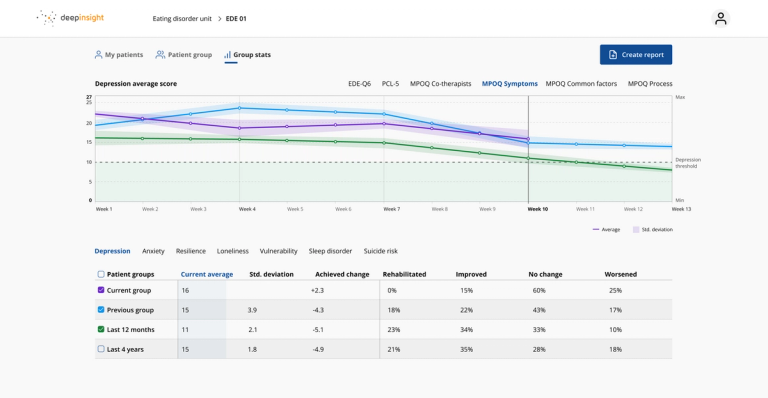Good utilisation of patient data can increase the effects of psychotherapy. Modum Bad is the first healthcare provider to use newly developed software from Deepinsight.
– We see a clear, positive effect of using data actively in patient care. We can easily change the direction and strengthen the course of treatment, explains Pål Ulvenes, psychology specialist and Head of Analysis at Modum Bad.
Modum Bad were early users of data in patient care and have been systematically collecting patient-reported data (PROM data) since the early 2000s.
– Their motivation and history make Modum Bad a perfect pilot customer for our newly developed software, says Martin Holtet, CTO of Deepinsight and responsible for the development of the software.
– Eventually, the software will be offered to several of the country's institutions and hospitals. Active use of real-time data in courses of treatment will undoubtedly improve patient treatment and provide good insights for healthcare professionals and the administration, he adds.

The software from Deepinsight visualises and compiles data in real-time for department heads and clinicians, and gives them an overview and insights into their own operations. The information can be used to improve the quality of their operations and patient care. This is called clinical intelligence.
Read: Clinical Intelligence from Deepinsight.
Better healthcare with real-time data
– Active use of health data makes it possible to follow-up patients better and provide them with better treatments because we are able to more easily monitor various therapies. We want to work more efficiently and use data in real-time in order to adjust the therapy treatment and take advantage of the opportunities data provides continuously. That is why we collaborate with Deepinsight, says Ulvenes from Modum Bad.
– Providing the right treatment for the right patient will result in better outcomes and better utilisation of resources, he adds.
The software developed by Deepinsight utilises data from several different sources. For Modum Bad, Deepinsight extracts patient-reported data from CheckWare and structured medical records data from DIPS. This way, the clinic can utilise the feedback from patients in real-time and set up adapted treatment courses that work.
– Journal data from DIPS is crucial for understanding the context and the medical history related to the patient-reported data from CheckWare, says Holtet.
The data retrieved from CheckWare and DIPS is systematised and displayed visually through a web interface. Here you can choose at which level to view the data, depending on the the type of user. As a therapist, you may want to get an overview of individual patients or patient groups, while the administration might find it more relevant to monitor aggregated data at group level for an entire department.
– We wanted an interface with few distractions that keeps it simple for the clinicians to quickly and easily find the information they are interested in. That’s why we have developed the software in close dialogue with the clinicians, Holtet explains.

Great benefits from using clinical intelligence
The software from Deepinsight is intuitive and the user easily logs in via the browser. The solution is built with a high degree of security, and uses, among other things, two-factor authentication when logging in.
Modum Bad points to several great benefits of using feedback-based data from patients in psychiatry, and Deepinsight will help to achieve these benefits.
Therapist and patient: The therapy track of patients at a ward is monitored in the software. This increases the effect of the therapy and reduces dropout rates. In addition, the software makes it possible to identify treatments that do not work, and it can be used as a decision support tool for therapists.
Treatment team: The clinics can allocate resources more efficiently with targeted interventions based on the patient's problem areas.
Therapist and competence: By following treatment data over time, therapists can develop their skills in the long run.
Department heads and administration: Can gain insight into what the effects of the treatments are and whether they are better or worse than for previous time periods. Thus, the administration can facilitate the best possible treatment of each patient.
– Modum Bad is helping to set a new standard for health data usage through access to real-time data. This also lays the foundation for using prediction and machine learning, which is something we want to add as functionality in newer versions of the software, says Holtet.

The first version will go live in 2022
The potential and opportunities to solve several of the healthcare industry’s challenges with the help of health data are great, but until now there has been sparse use of data in the healthcare sector. With Deepinsight's software, an important step is taken to make it easier to use health data.
– It has been important for us to work with a forward-leaning partner within healthcare who sees the possibilities in clinical intelligence and real-time data and how this is the future of healthcare. Modum Bad gave us that opportunity, says Holtet.
The software will be used by Modum Bad over the summer, when the first version of the product is ready.
– As we develop the software further, it will be offered to more institutions in psychiatry, but also to areas outside psychiatry. The potential for clinical intelligence is great, and we have made it possible for the software to connect to desired data sources and visualise it in a web interface regardless of health area, Holtet explains.
– In the long run, the software will make the healthcare industry more data-driven and contribute to better treatment courses for clinicians, patients and administration, he concludes.



